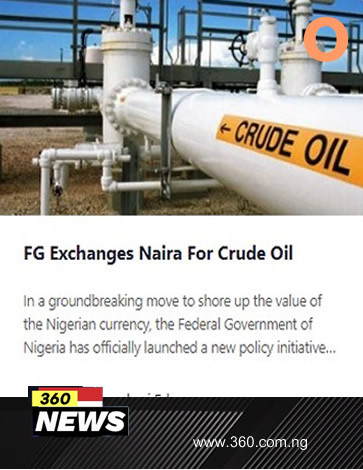FG Exchanges Naira For Crude Oil

In a groundbreaking move to shore up the value of the Nigerian currency, the Federal Government of Nigeria has officially launched a new policy initiative that mandates the sale of crude oil and refined petroleum products in naira, starting October 1, 2024.
The Minister of Finance and Coordinating Minister of the Economy, accompanied by key stakeholders in the Nigerian oil and gas sector, made the announcement following a successful post-commencement review of the initiative.
The policy is expected to significantly reduce pressure on the naira, eliminate unnecessary transaction costs, and improve the availability of petroleum products across the country.
In a statement, the committee behind the initiative highlighted the potential benefits of the switch to naira-based transactions in the Nigerian oil and gas sector. The move is expected to boost the domestic currency and provide a much-needed boost to Nigeria’s ailing economy.
However, questions remain over the implementation of the policy and how it will impact the operations of major players in the Nigerian oil and gas industry.
A silence has enveloped key players in the Nigerian oil and gas industry, with neither NNPC, the Dangote Refinery, or officials from the Nigerian Upstream Petroleum Regulatory Commission, Federal Ministry of Finance, or NNPC responding to inquiries about the naira-for-crude deal.
As the country awaits further developments on the policy’s implementation, the silence from these key players raises questions about the feasibility and sustainability of the initiative.
Amidst the uncertainty surrounding the naira-for-crude policy, one thing is clear: the stakes are high for Nigeria. A successful implementation of the policy could represent a significant step forward in the country’s efforts to strengthen its economy and position itself as a major player in the global oil and gas market.
However, the challenges involved in transitioning to naira-based transactions in a sector that has historically been dominated by the U.S. dollar cannot be underestimated.
The shift to naira-based transactions in the Nigerian oil and gas sector is not just a financial or economic issue; it also carries significant political and social implications.
On one hand, the policy represents a bold assertion of Nigeria’s economic sovereignty, signaling the country’s desire to move away from dependence on foreign currencies. On the other hand, it has the potential to spark tensions between the government and powerful oil and gas industry interests, who may resist the move to naira-based transactions.
References and Citations:
- Vanguard – FG commence sales of in naira
- Punch – crude – for – naira – sales commenced October I – FG
- Tribune – FG begins crude oil sales in Nigeria to Dangote
Picture News







